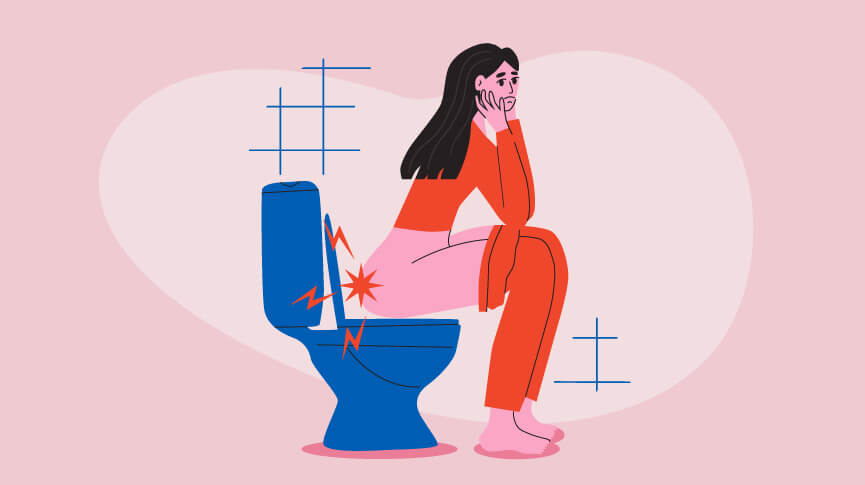A Pain in The Butt: Hemorrhoids

If you’ve ever had hemorrhoids, the mere mention of the word might cause you to clench your cheeks in terror. Hemorrhoids, also known as piles, wreak havoc on your rectum and bowel habits, and to be literate – are a total pain in the butt. But what exactly are hemorrhoids, what causes them, and how do you treat them – or help prevent them from happening in the first place. Let’s find out!
What Are Hemorrhoids?
You most likely know what hemorrhoids are, or at least how they feel when you have one, but what are they exactly? This annoying and sometimes painful condition is marked by swollen and inflamed veins around your anus or the lower part of your rectum. There are two kinds of hemorrhoids, external and internal. External ones form under the skin that surrounds your anus, while internal ones form in the lining of your anus and lower rectum.
Hemorrhoid Symptoms
When it comes to hemorrhoids, usually when you know, you know. Still, some of the symptoms, like rectal bleeding, can be especially alarming. Think you might have developed your own case of piles?
Here are some hemorrhoid symptoms to watch out for:
- Itching around your anus.
- Pain in the anus, especially when sitting – like we said, a pain in the butt.
- Bleeding from your rectum – this tends to happen more with internal hemorrhoids.
- Prolapse, which happens when the hemorrhoid falls through the opening of your anus.
- External hemorrhoids may cause uncomfortable lumps or swelling near your anus.
What Causes Hemorrhoids?
If you’ve had a hemorrhoid, it’s nothing to be ashamed of. In fact, about 50% of adults will have one by the time they reach age 50. So there’s pretty decent odds that this information will come in handy one day if it’s not already. Why are they so common? The sensitive tissue of the anus is susceptible to all sorts of changes, especially considering all that we put it through during our lifetimes.
These are the most common causes of hemorrhoids:
- Too much pressure on veins around the anus. Think of the different kinds of pushing that you use your pelvic floor for.
- Straining while going to the bathroom.
- Chronic constipation or diarrhea.
- Pregnancy and birth.
- Being over age 50.
- Being a smoker.
- A family history of hemorrhoids.
- Having anal sex or using butt plugs.
- Frequently lifting heavy objects.
- Excess weight.
- Weakening of supportive tissues in the rectum, which can happen with aging as well as with pregnancy.
As scary as it can be to see blood when you wipe, hemorrhoids are not life threatening, and typically go away on their own without treatment. There are still things you can do in the meantime to ease any discomfort you’re experiencing and help them heal faster – as well as prevent them from happening in the first place.
How to Treat and Prevent Hemorrhoids
When hemorrhoids do spring up, we’ve got your back (side). Here’s how to prevent, treat and manage discomfort from hemorrhoids:
- Avoid too much straining or heavy lifting.
- Avoid rubbing, or itching as it can make symptoms worse.
- Treat any constipation through movement, diet, and taking gentle stool softeners if needed – psyllium husk is a common one.
- Eat a high fiber diet, think things like sweet potatoes, pears, and leafy greens.
- Drink plenty of fluids – especially water.
- Avoid sitting on the toilet for too long.
- Keep good hygiene, but avoid using soap around the anus, as it can irritate hemorrhoids.
- Use an over-the-counter pain reliever if needed like acetaminophen, aspirin, or ibuprofen.
- Use OTC topical creams and ointments for itching and pain.
- Use a warm or cold compress on the area.
- Use witch hazel pads on your anus.
- Take warm baths or a sitz bath using a small tub filled with a few inches of water that you sit in.
- Topical herbal medicine using plants like chamomile, yarrow, and neem.
If your hemorrhoid persists despite your at home treatments, you may need to try an in office procedure. It’s recommended to see a professional if your hemorrhoid doesn’t get better after one week of home treatment. First your provider will give you a proper diagnosis through a visual exam and possibly a digital rectal exam. They may need to do additional imaging tests using a small camera to examine abnormalities along the colon, rectum, anus.
Some possible procedures that are done for persistent hemorrhoids are:
- A rubber band ligation which cuts off circulation to the hemorrhoid.
- Your provider may inject a chemical directly into your blood vessel causing the hemorrhoid to shrink.
When to Get Help
While most hemorrhoids are harmless, there are a few things to watch out for. It’s important to reach out to your healthcare provider if you experience rectal bleeding or have black bowel movements. They can help rule out other conditions that can cause bleeding like Crohn’s disease, ulcerative colitis, colorectal cancer, and anal cancer. Although rare, other potential risks that can arise from hemorrhoids are blood clots in the swollen vein, infection of the hemorrhoid, or iron deficiency anemia due to blood loss. Stay on top of your hemorrhoid health by taking steps to prevent them, treating them if you do get one, and getting help when you need to.

Natasha (she/her) is a full-spectrum doula and health+wellness copywriter. Her work focuses on deconstructing the shame, stigma, and barriers people carry around birth, sex, health, and beyond, to help people navigate through their lives with more education and empowerment. You can connect with Natasha on IG @natasha.s.weiss.



I have this pains when am on my menstruation and it’s as if I hv constipation why is that?